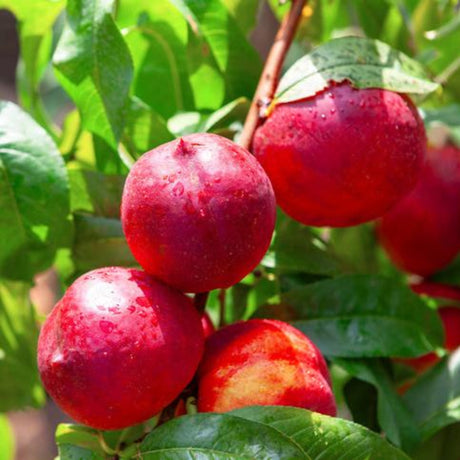- $12995
$29995Unit price /Unavailable - $9995
$23995Unit price /Unavailable
Nectarine Trees – Sweet, Juicy, and Perfect for Home Gardens!
Nectarine trees are a must-have for any fruit lover who enjoys fresh, homegrown produce. These beautiful trees produce deliciously sweet and juicy nectarines, known for their smooth skin and rich flavor. Whether you want a small backyard tree or a larger orchard addition, nectarines are a fantastic choice for both novice and experienced gardeners.
Why Grow a Nectarine Tree?
- Delicious Homegrown Fruit – Enjoy fresh, chemical-free nectarines straight from your tree!
- Fast-Growing & Productive – Most varieties produce fruit within 2-3 years of planting.
- Compact & Versatile – Many dwarf varieties fit perfectly in small gardens or containers.
- Beautiful & Functional – These trees boast lovely spring blossoms before producing fruit.
Varieties to Consider
Nectarines come in many types, ranging from yellow to white-fleshed and from clingstone to freestone. Some popular varieties include:
- Fantasia – A late-season variety with bright yellow flesh and bold flavor.
- Arctic Star – A low-acid, white-fleshed variety with an incredibly sweet taste.
- Sunred – A great option for warmer climates, known for its early ripening.
Growing & Care Tips
Sunlight Needs – Full sun (at least 6-8 hours daily) ensures the best fruit production.
Watering – Keep soil consistently moist but not soggy, especially in the growing season.
Soil Requirements – Well-draining, sandy or loamy soil with a pH of 6.0-7.0.
Pruning – Regular pruning helps maintain shape, remove dead branches, and boost fruit yield.
Best Climates for Nectarine Trees
Nectarine trees thrive in USDA Zones 5-9, depending on the variety. They require chilling hours (cold exposure in winter) to produce fruit, making them ideal for temperate regions. If you live in a warmer climate, look for low-chill varieties suited to your area.
When to Harvest Nectarines
Nectarines are usually ready to pick in mid-to-late summer, depending on the variety. You’ll know they’re ripe when they develop a full, vibrant color and slightly soften to the touch. For the best flavor, let them ripen fully on the tree!
Pest & Disease Considerations
Like peaches, nectarines can be prone to pests like aphids and fruit flies, as well as fungal diseases like leaf curl. Using organic sprays, maintaining proper air circulation, and keeping the tree healthy can help prevent problems.
Perfect for Any Garden!
Whether you’re planting a single tree in your yard or creating an orchard, nectarine trees are a rewarding and delicious investment. With proper care, they’ll provide years of fresh fruit, shade, and beauty to your landscape with Free Shipping!





